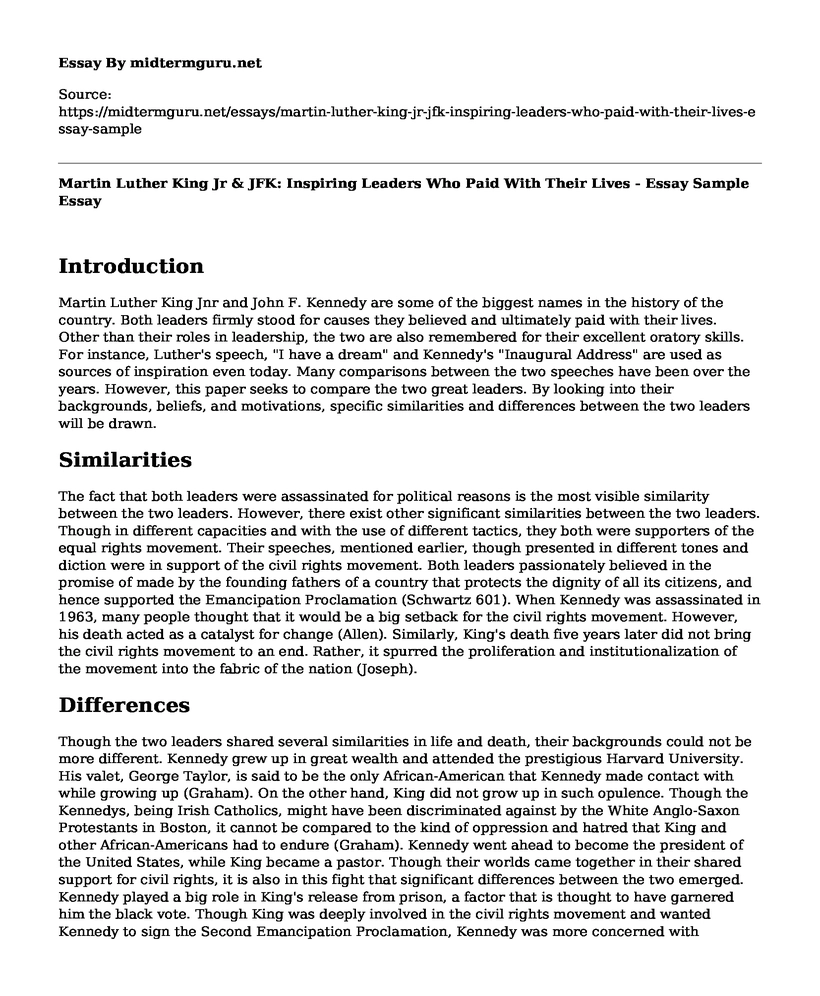Introduction
Martin Luther King Jnr and John F. Kennedy are some of the biggest names in the history of the country. Both leaders firmly stood for causes they believed and ultimately paid with their lives. Other than their roles in leadership, the two are also remembered for their excellent oratory skills. For instance, Luther's speech, "I have a dream" and Kennedy's "Inaugural Address" are used as sources of inspiration even today. Many comparisons between the two speeches have been over the years. However, this paper seeks to compare the two great leaders. By looking into their backgrounds, beliefs, and motivations, specific similarities and differences between the two leaders will be drawn.
Similarities
The fact that both leaders were assassinated for political reasons is the most visible similarity between the two leaders. However, there exist other significant similarities between the two leaders. Though in different capacities and with the use of different tactics, they both were supporters of the equal rights movement. Their speeches, mentioned earlier, though presented in different tones and diction were in support of the civil rights movement. Both leaders passionately believed in the promise of made by the founding fathers of a country that protects the dignity of all its citizens, and hence supported the Emancipation Proclamation (Schwartz 601). When Kennedy was assassinated in 1963, many people thought that it would be a big setback for the civil rights movement. However, his death acted as a catalyst for change (Allen). Similarly, King's death five years later did not bring the civil rights movement to an end. Rather, it spurred the proliferation and institutionalization of the movement into the fabric of the nation (Joseph).
Differences
Though the two leaders shared several similarities in life and death, their backgrounds could not be more different. Kennedy grew up in great wealth and attended the prestigious Harvard University. His valet, George Taylor, is said to be the only African-American that Kennedy made contact with while growing up (Graham). On the other hand, King did not grow up in such opulence. Though the Kennedys, being Irish Catholics, might have been discriminated against by the White Anglo-Saxon Protestants in Boston, it cannot be compared to the kind of oppression and hatred that King and other African-Americans had to endure (Graham). Kennedy went ahead to become the president of the United States, while King became a pastor. Though their worlds came together in their shared support for civil rights, it is also in this fight that significant differences between the two emerged. Kennedy played a big role in King's release from prison, a factor that is thought to have garnered him the black vote. Though King was deeply involved in the civil rights movement and wanted Kennedy to sign the Second Emancipation Proclamation, Kennedy was more concerned with international affairs such as the Cold War and Cuba Missiles in the initial years of his presidency (Graham). Moreover, while King agitated for equality on a moral argument, Kennedy looked at the issue from a legal perspective. However, he came to adopt a moral perspective as his presidency progressed (Graham).
Conclusion
Martin Luther King Jr. and John F. Kennedy are some of the most recognizable names in the history of the country. However, though they shared a passion for equality in society, they were standing on different pedestals. One was a president while the other was a pastor. One believed in the pursuit of a moral route to achieve equality while the other was for a legal route. Moreover, while King was in the frontline of the fight, Kennedy was in the side-lines. Despite these differences, both leaders played a critical role in the civil rights movement both in life and death.
Works Cited
Allen, Candace. "How John F Kennedy's assassination spurred the drive for racial equality." 19 November 2013. The Gurdian. 6 June 2019. <https://www.theguardian.com/world/2013/nov/19/john-f-kennedy-assassination-racial-equality-jfk>.
Graham, Don. "MLK and JFK: Much in common, worlds apart." July 2017. Dallas News. 6 June 2019. <https://www.dallasnews.com/arts/books/2017/07/12/kennedy-and-king-steven-levingston-review>.
Joseph, Paniel E. "How Martin Luther King Jr.'s assassination changed America 50 years ago and still affects us today." 15 January 2018.
The Wahington Post. 6 June 2019. <https://www.washingtonpost.com/news/post-nation/wp/2018/01/15/kings-assassination-shaped-americas-identity-50-years-ago-and-continues-to-shape-it-today/?noredirect=on&utm_term=.4af73cb3ddb4>.
Schwartz, Barry. "The emancipation proclamation: Lincoln's many second thoughts." Society 52.6 (2015): 590-603. <https://link.springer.com/article/10.1007/s12115-015-9954-7>.
Cite this page
Martin Luther King Jr & JFK: Inspiring Leaders Who Paid With Their Lives - Essay Sample. (2023, Jan 19). Retrieved from https://midtermguru.com/essays/martin-luther-king-jr-jfk-inspiring-leaders-who-paid-with-their-lives-essay-sample
If you are the original author of this essay and no longer wish to have it published on the midtermguru.com website, please click below to request its removal:
- The Development, Colonization and Gradual Resurgence of Latin America - History Paper Example
- The 2016 Presidential Election - Essay Sample
- American Revolution: War for US Freedom (1775-1783) - Essay Sample
- Essay Sample on War Films
- Two Standards of Culturally Competent Nursing Care: Social Justice & Critical Reflection - Research Paper
- Public Administration: Trust & Toxic Environments - Essay Sample
- The Beginnings of US Slavery: The 1619 Voyage of the White Lion - Essay Sample







